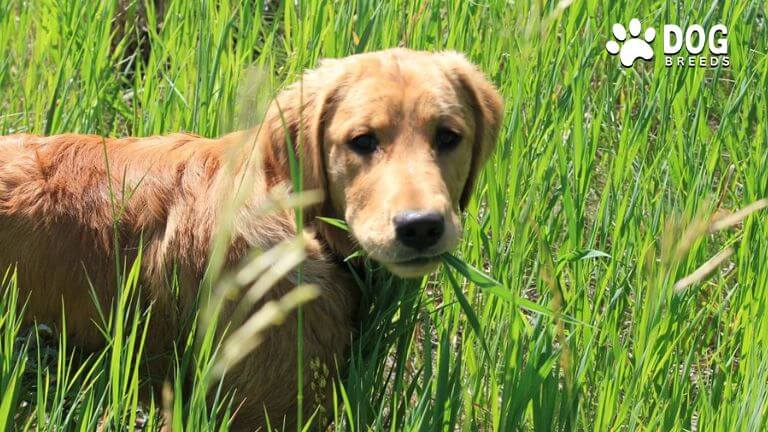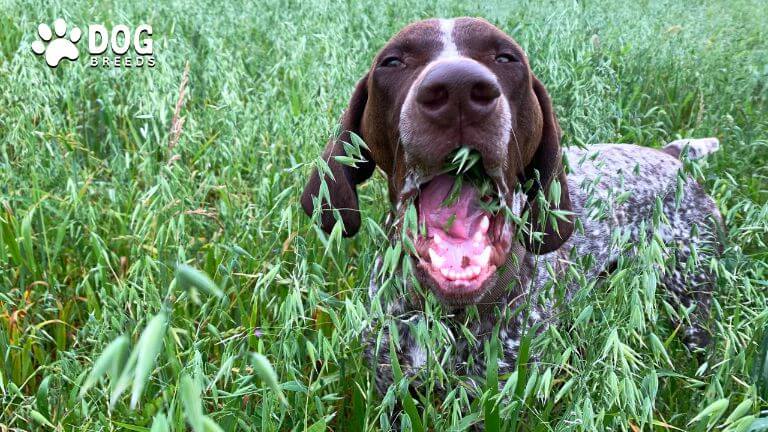Why Do Dogs Eat Grass? Causes, Tips, and When to Seek Help
Many dog owners have observed their pets munching on Grass and wondered why. Is it because they feel unwell, enjoy the taste, or is there a deeper reason? Understanding why your dog eats Grass can help ensure their health and well-being while easing any concerns you might have.
Why Do Dogs Eat Grass?

Dogs eating Grass is a common and natural behavior. While it might seem unusual, there are several possible reasons:
1. They Enjoy It
Some dogs simply like the taste or texture of Grass. As omnivores, dogs naturally eat a mix of plant and animal-based foods. Grass may taste better during specific seasons, such as spring and summer, when it is fresh and tender.
2. Boredom
Dogs that don’t receive enough mental stimulation or physical exercise may chew Grass as a way to pass the time. This behavior can also indicate that your dog is seeking more engagement and enrichment.
3. Stomach Upset
A popular belief is that dogs eat Grass to make themselves vomit and relieve an upset stomach. However, studies, including a 2008 survey of 1,500 dogs, found that fewer than 10% of dogs appeared sick before eating Grass, and only 25% vomited afterward.
4. Dietary Fiber Needs
Some dogs may eat Grass because they lack enough fiber in their diet. Fiber helps with digestion, and in rare cases, a high-fiber diet has been shown to reduce grass-eating behavior.
5. Parasite Management
Grass might play a role in flushing parasites from the intestines. The rough texture of Grass could help trap and remove parasites as they pass through the digestive system.
Is It Normal for Dogs to Eat Grass?
Yes, grass-eating is normal for dogs. A survey revealed that nearly 70% of dogs eat plants at least once a week. Younger dogs and wild dogs have also been observed eating Grass, suggesting that this behavior is natural and instinctive.
However, while occasional grass-eating is typically harmless, certain behaviors could signal a problem.
When Should You Be Concerned?
Contact your veterinarian if your dog exhibits any of the following behaviors:
- Eating Grass Excessively: Frequent or obsessive grass-eating may indicate an underlying issue.
- Vomiting Often: If your dog regularly vomits after eating Grass, this could signal gastrointestinal problems.
- Other Symptoms of Illness: Signs such as lethargy, loss of appetite, diarrhea, or constipation require professional attention.
How to Prevent or Manage Grass-Eating
If your dog’s grass-eating concerns you, there are steps you can take:
Consult Your Vet
- A vet can check for dietary deficiencies, gastrointestinal issues, or parasites. They may recommend adjustments to your dog’s diet, such as adding more fiber.
Provide Enrichment
If boredom is the cause, keep your dog mentally and physically active.
- Use puzzle feeders for meals.
- Play interactive games like fetch or obedience training.
- Take them on longer or more stimulating walks.
Monitor Grass Quality
- Ensure your dog doesn’t eat Grass treated with pesticides, herbicides, or fertilizers, as these chemicals can be toxic. Watch out for slugs and snails on the Grass, as they may carry lungworm.
Should You Stop Your Dog From Eating Grass?
If your dog is healthy, wormed regularly, and only eats Grass occasionally, there is little need to worry. Grass offers minimal nutritional value, but small amounts are unlikely to harm your pet.
However, if grass-eating becomes excessive or is paired with signs of illness, consult your vet promptly.
Conclusion
Understanding your dog’s grass-eating behavior can bring peace of mind and ensure their health. If you’re unsure about your dog’s behavior or health, always seek advice from a veterinarian. For more tips on keeping your dog happy and healthy, explore additional guides or consult a Kennel Club Accredited Instructor for behavior concerns.
By paying attention to your dog’s habits, you can address potential issues early and provide the care they need to thrive.
- Standard Poodle Dog Breed: The Elegant Athlete of the Canine World - July 28, 2025
- Golden Retriever: The Ultimate Guide to a Beloved Canine Companion - July 22, 2025
- How Big Can Maine Coon Cats Get? - July 22, 2025




